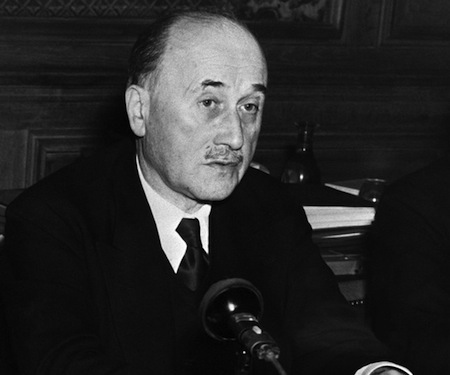The Nobel Peace Prize this morning was awarded to the European Union ‘for over six decades contributed to the advancement of peace and reconciliation, democracy and human rights in Europe’:![]()
Thorbjorn Jagland, the chairman of the panel awarding the prize, said it was a signal focusing on the union’s historical role binding France and Germany together after World War II and its perceived impact in spreading reconciliation and democracy beyond the Iron Curtain that once divided Europe and on to the Balkans. “The stabilizing part played by the E. U. has helped to transform most of Europe from a continent of war to a continent of peace,” he said.
I’ve got a busy morning, but I wanted to share three initial observations:
First, this is obviously a not-so-subtle attempt by the Nobel Committee to provide some encouragement at a time when the EU is in a bit of a crisis — not just in the sense of lurching to save the eurozone, but a more existential political crisis. In many ways, the EU is right now a sort of halfway house that resembles something like the pre-constitutional United States, when it was governed by the ineffective Articles of Confederation.
The EU today has a monetary union, but no fiscal or political union to match, despite the failure of the much-derided “EU constitution” effort in 2004 and 2005 that ended with a resounding failure in referenda in France and the Netherlands. With German chancellor Angela Merkel this week on a trip in Greece to discuss that country’s finances after four years of recession and biting austerity designed to keep Greece in the eurozone, the Nobel Prize will be a reminder that the stakes of the eurozone’s success really are more than just determining the outcome of an experiment in monetary policy, but the future of the entire ‘European project’ — and I think that’s a point upon which both the pro-federalist ‘neo-functionalism’ and the more skeptical ‘intergovernmentalism’ schools of EU integration would agree.
Secondly, it feels like a posthumous Nobel award to Jean Monnet (pictured above) and Robert Schuman, a former prime minister and foreign minister of France. The two were as responsible as anyone for the establishment of the EU’s predecessor, the European Coal and Steel Community in 1951 among France, Germany, Italy, the Netherlands, Belgium and Luxembourg. Monnet’s plan for coal and steel cooperation and the 1950 Schuman Declaration largely became the blueprints for the creation of the ECSC.
If it seems shocking that the EU has been awarded the Nobel Peace Prize, it’s only because it has been so successful. From cooperation over coal in the Saar, the European project expanded into a means for creating a common market to tear down tariffs among European nations, a vehicle for unity against the Soviet Union, a mechanism for boosting fledgling democracy in Greece, Portugal and Spain in the 1980s, a salve to soothe Europeans worried about the reunification of Germany in the early 1990s, and the easiest way for “western Europe” to reach out to the newly liberated eastern European states following the collapse of the Soviet Union. Today, the EU remains a stabilizing force in the Balkans — with Serbia, the last bastion of ethnic-based warfare on the European continent in the 1990s, now a fledgling democracy that itself is in EU accession talks.
Finally, if you think of the Prize as both a boost to EU at a time of institutional stress and an acknowledgement of Monnet’s efforts, I also see it as an acknowledgement of the leadership of Jacques Delors — the eighth president of the European Commission, he more or less railroaded the Maastricht treaty through what was then the European Economic Community in 1992 (despite some fireworks with UK prime minister Margaret Thatcher). Although I think it’s still too early to tell whether the euro as a single currency is a success or a failure, if the EU pulls through this crisis by developing a fiscal union and a political union commensurate with its monetary union, Delors will rightly be seen as just as important as Monnet and Schuman for his role in bringing about a real supranational union of European states.
